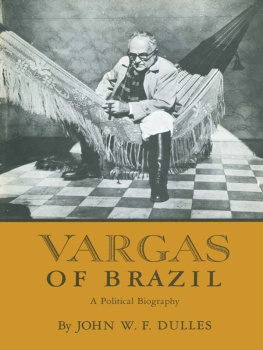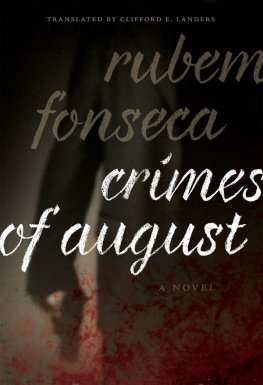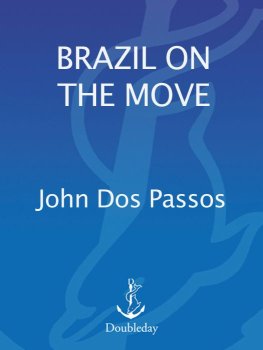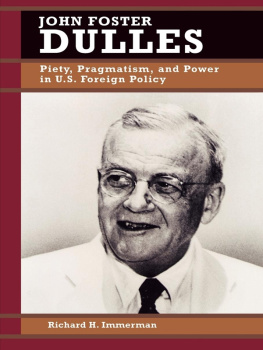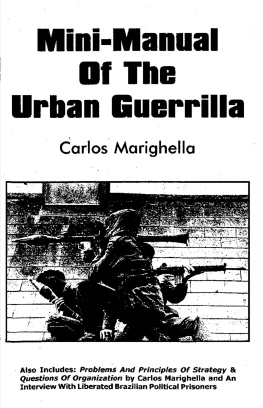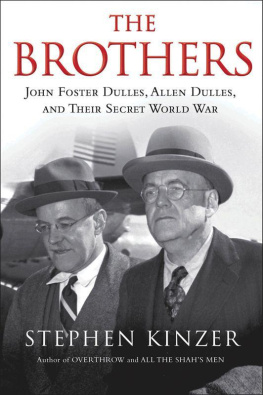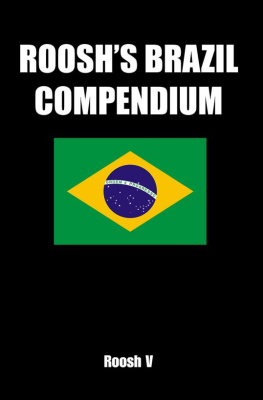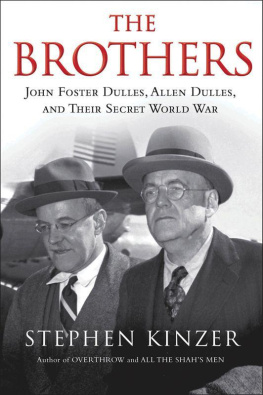JOHN W. F. DULLES
Carlos Lacerda, Brazilian Crusader
Volume I: The Years 19141960
UNIVERSITY OF TEXAS PRESS, AUSTIN
Copyright 1991 by the University of Texas Press
All rights reserved
Printed in the United States of America
First Edition, 1991
Requests for permission to reproduce material from this work should be sent to Permissions, University of Texas Press, Box 7819, Austin, Texas 78713-7819.
utpress.utexas.edu/index.php/rp-form
Library of Congress Cataloging-in-Publication Data
Library ebook ISBN: 978-0-292-73646-7
Individual ebook ISBN: 978-0-292-78936-4
DOI: 10.7560/711259
Dulles, John W. F
Carlos Lacerda, Brazilian crusader / by John W. F. Dulles. 1st ed.
p. cm.
Includes bibliographical references and index.
Contents: v. 1. The years 19141960
ISBN 978-0-292-72373-3
1. Lacerda, Carlos. 2. BrazilPolitics and Government19301954. 3. BrazilPolitics and Government19541964. 4. BrazilPolitics and Government19641985. 5. JournalistsBrazilBiography. 6. PoliticiansBrazilBiography. I. Title.
F2538.22.L3D85 1991
981.06092dc20
[B]
90-38782
CIP
For CC
whose encouragement has been a blessing
Contents
When Major Rubens Vaz, who would be killed in 1954 by bullets meant for Lacerda, suggested that Lacerda soften his scathing attacks, the journalist and orator defended his bruising political style by insisting that Brazil needs to be shaken up. It was a course of action for which Lacerda was admirably fitted. Placing himself at the center of one political crisis after another, many created by his own pen and oratory, he aroused passions as few others have done in Brazils republican history.
Historian Jos Honrio Rodrigues has written that no single person exerted as much influence on the Brazilian historical process as Carlos Lacerda from 1945 to 1968. Political attacks, a key to that vast influence, forced lawyer Thomas Leonardos to conclude that Lacerda was a tempest. Another prominent lawyer, Dario de Almeida Magalhes, points out that Lacerda was the most fearful and implacable adversary known in this country, at least in the last fifty years.
The newspaper columns of Lacerda, unsparing in their denouncements and frequently sensational, reveal the broad interests, diligence, and intelligence of a man full of ardor. But every person has a number of facets, and the newspaper columns tend to hide the man who was compassionate. The sight of suffering often brought tears to his eyes. Besides, his friends are constantly speaking of how he went out of his way to be considerate. Former Finance Secretary Mario Lorenzo Fernandez says that generosity was the outstanding personal characteristic of Lacerda.
Banker and politician Herbert Levy mentions two Lacerdas, the monster behind the journalists typewriter and the pleasing, understanding conversationalist. It was the latter I came to know, gracious and interesting. His descriptions of situations in which he had found himself were spiced with a sense of humor, touched with satire, that I found delightful. If he was quick in his columns to hammer away at the shortcomings of political figures, in these conversations I heard more about lovable idiosyncrasies. He reached an all-time high in overlooking shortcomings when he surprised me by asking me to become his biographer.
With financial assistance from the Andrew W. Mellon Foundation and the Institute of Latin American Studies at the University of Texas at Austin, information about Lacerdas life has been collected. The work was greatly assisted by Daphne F. Rodger, Fernando Goldgaber, Vera Lacerda Paiva, and Cacilda M. Rgo, by letters in the hands of the Lacerda family and others, and by the documents at the University of Braslia and in the Walter Cunto collection in Rio de Janeiro.
The work indicates that Lacerdas life can be divided into four stages: (1) the years until 1955 when journalism predominated; (2) the 19551960 period, when, according to Congressman Paulo Pinheiro Chagas, he was the greatest tribune to have taken a seat in the Chamber of Deputies; (3) his years as a constructive governor (19601965), presidential candidate, and participant in the events that saw two presidents fall from office; and (4) the years in which he became a political outcast while battling the military regime that ended only after his death in 1977.
A narrative like the present one, which seeks to cover the first two periods of Lacerdas life, would be incomplete without references to the literary circle that included Carlos, an aspiring playwright and literary critic. And it would be incomplete without a few scenes from the life of his father Maurcio, both because the difficult relationship between father and son is part of the biography and because the two were so similar. Neither was underhanded and each owed his political support to voter appeal rather than to deals with power groups. They were exceedingly independent, regardless of the cost. Maurcio, one of the most passionate orators of his generation, stirred the masses in the streets against the oligarchy and never hesitated to antagonize the top political figures.
Carlos, zealously pro-Communist in his youth, became, like his father, the object of attacks originating in the Communist Party. In 1954, when the curtain was falling on the first period of his life, his strident anti-Communism and role in the events that led to the suicide of President Getlio Vargas were so provocative that mobs in the streets shouted Death to Lacerda. But the ballot boxes made it almost immediately apparent that the appeal of the courageous campaigner against corruption was extraordinary. He received more votes than had ever been cast in Brazil for a congressional candidate.
Former Foreign Minister Afonso Arinos de Melo Franco, who was prominent in the federal legislature when Lacerda was there, states that Lacerdas activities affected adversaries and supporters to such an extent that no one will be able to be compared with him. In the hope of producing a companion to that fat volume and report on some of those effects, I have tried to reconstruct the settings in which the pronouncements were made and, thus, have given attention to politicking.
Thanks in large measure to Lacerda, politics were turbulent in 1955, his first year as a congressman. It was a presidential election year, and he hoped to deliver a blow to the leading candidates by his disclosure of the Brandi letter. The letter, which he considered authentic, was a forgery, and he was described by his adversaries as a forger himself.
Already Lacerda had advocated a postponement of elections in favor of an emergency regime to reform political ways and thus had gained the reputation of desiring a coup and dictatorship. When he demanded in November 1955 that the election victors, Juscelino Kubitschek and his running mate, Joo Goulart, be prevented from taking office, he did nothing to diminish that reputation. The pro-Kubitschek counter-coup of War Minister Henrique Lott led him to exile himself abroad, thus ending what he later considered the worst year of his life.
Following his return to Brazil in 1956, and for most of his career in Congress, Lacerda was barred from using radio or television because Kubitschek feared that broadcasts of his oratory might bring about the fall of the government. So combative was the freshman congressman that he was awarded the post of leader of the opposition party. The government, hoping to have him jailed, argued that his attempt to uncover corruption had impaired the national security. Thus he became the central figure of a parliamentary drama that stirred the nation. A traitor is loose in the streets, the pro-government


